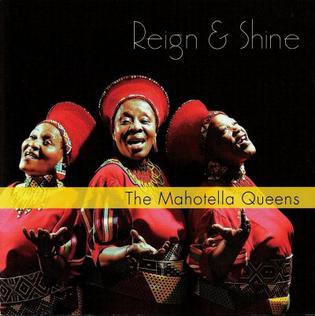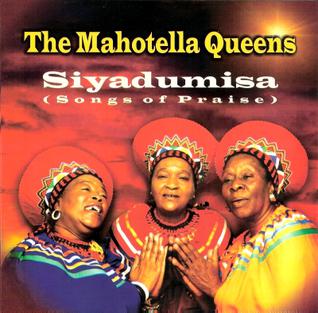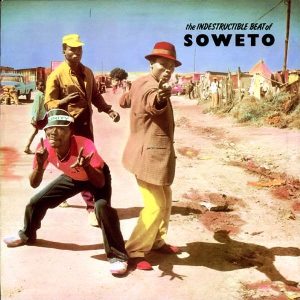Notes
- 1 2 Info.gov.za, National Orders: Order of Ikhamanga, Hilda Tloubatla Archived 2007-09-30 at the Wayback Machine , 2005.
| Studio albums |
|
|---|---|
Hilda Semola Tloubatla | |
|---|---|
| Birth name | Hilda Semola Tloubatla |
| Born | 1942 South Africa |
| Genres | Mbaqanga, mgqashiyo |
| Occupation(s) |
|
Hilda Semola Tloubatla (born 1942) is a South African mbaqanga singer, and the lead singer of the acclaimed group the Mahotella Queens. Tloubatla was born in Payneville, South Africa before moving to kwaThema township in 1951 as a result of (what was) the apartheid government's 'Group Areas Act' in the country. [1]
Tloubatla first began her music career by recording at the South African Broadcasting Corporation in the late 1950s and early 1960s. However, it wasn't until she joined the session musician team at Gallo Record Company in 1964 that Tloubatla first gained national fame. She was immediately recruited into a new female group, the Mahotella Queens, as a lead singer, [1] along with fellow group members Nobesuthu Mbadu, Mildred Mangxola, Juliet Mazamisa and Ethel Mngomezulu. The five Queens were then paired with a mbaqanga instrumental team, the Makgona Tsohle Band and the gruff, "groaning" vocals of Simon Mahlathini Nkabinde, and not long afterwards, the band – billed as Mahlathini and the Mahotella Queens – were receiving instant fame.
In 1971, several original Mahotella Queens (including Tloubatla) had left to pursue other directions in the music business, such as joining other groups, and so an entirely new line-up of Queens was formed. Tloubatla became a regular member of rival group Izintombi Zesi Manje Manje, but kept returning to the new group of Mahotella Queens on a semi-regular basis.
In 1983, the five original Queens (Tloubatla, Mbadu, Mangxola, Mazamisa and Mngomezulu) were reunited with Mahlathini and the Makgona Tsohle Band by Makgona Tsohle guitarist and Queens producer Marks Mankwane. Their comeback release, Amaqhawe Omgqashiyo , was a hit in South Africa. Due to the success of Paul Simon's Graceland 1986 album and tour (in which he collaborated with Ladysmith Black Mambazo, Stimela and others), South African music was in demand. Three original Queens, Tloubatla, Mbadu and Mangxola, were reunited once more with their bandmates. Their international popularity was profound.
Even after the deaths of Mahlathini and several members of the Makgona Tsohle Band, the three Queens (who are all grandmothers and are over seventy years old) remained at the helm until the death of Mbadu in 2021.

South Africa has a long rich history of music that has been a huge impact on the global music, especially on African music. South African music has a wide variety of genres which includes kwaito, marabi, gqom, isicathamiya, mbaqanga, bubblegum music, amapiano and other types of music. South Africa has one of the most influential and unique music in Africa, especially in Southern Africa, to point where countries such as Namibia, Botswana have their own version of Kwaito, House music. On top of that, South Africa is home to many world-famous musicians from different genres such as Hugh Masekela, Ladysmith Black Mambazo, Soweto Gospel Choir and Miriam Makeba. South African music has been influenced by its native African music, American music and European music. However, it was the native African sound that pioneered South African music into what it is today. Some artists from South Africa had been nominated for grammy awards and some even won grammy awards.
Mbaqanga is a style of South African music with rural Zulu roots that continues to influence musicians worldwide today. The style originated in the early 1960s.

The Mahotella Queens is a South African female band formed in 1964 by music producer Rupert Bopape, consisting of Hilda Tloubatla, Nobesuthu Mbadu, and Amanda Nkosi. The group is noted for their distinct vocal harmony sound, guitar-led mbaqanga music, and fast stage dancing.

Below the Waste is Art of Noise's fourth full-length original album and their last album for China Records before Anne Dudley re-formed the group with ZTT's Trevor Horn and Paul Morley for 1999's The Seduction of Claude Debussy.

Simon "Mahlathini" Nkabinde was a South African mbaqanga singer. Known as the "Lion of Soweto", Nkabinde is the acknowledged exponent of the deep-voiced, basso profundo "groaning" style that came to symbolize mbaqanga music in the 1960s. Nkabinde was also a very active live performer in South Africa, recording and performing with the Mahotella Queens and the backing Makgona Tsohle Band from 1964 to 1971, and then again from 1983 to 1999. The Mahlathini and the Mahotella Queens act was propelled into international stardom in the wake of Paul Simon's 1986 Graceland album.

Mahlathini and the Mahotella Queens were a South African mbaqanga supergroup made up of the three musical acts linked together by talent scout and record producer Rupert Bopape at the Gallo Recording Company in Johannesburg, South Africa in 1964. The group composed of the following three distinct parts:
The Makgona Tsohle Band was a South African instrumental band that is noted for creating the mbaqanga music style. Mbaqanga is an acculturated popular South African music that emerged in the 19th century. Mbaqanga is also referred to as township jive. The group was formed in 1964 at Mavuthela, and became the Mavuthela house band. It garnered success by backing fellow Mavuthela-Gallo stars, Mahlathini and the Mahotella Queens. It is often referred to as the South African equivalent to Motown's The Funk Brothers.

Gallo Record Company is the largest record label in South Africa. It is based in Johannesburg, South Africa, and is owned by Arena Holdings. The current Gallo Record Company is a hybrid of two South African record labels, rivals between the 1940s and 1980s: the original Gallo Africa (1926–85) and G.R.C.. In 1985 Gallo Africa acquired G.R.C.; as a result, Gallo Africa became known as Gallo-GRC. Five years after the acquisition, the company was renamed Gallo Record Company.
Nobesuthu Gertrude Mbadu Shawe was a South African mbaqanga singer, and a singer in the acclaimed group the Mahotella Queens.
Nontsomi Mildred Mangxola is a South African mbaqanga singer, and a singer in the acclaimed group the Mahotella Queens. Mangxola was born in Benoni, South Africa, and loved singing from a young age. She was also a part of local girl group The Daveyton Queens.
Thokozile is a 1986 hit by the South African mbaqanga group Mahlathini and the Mahotella Queens. The album was a reunion of Mahlathini with the backing Makgona Tsohle Band and three of the original Queens, Hilda Tloubatla, Nobesuthu Mbadu and Mildred Mangxola. The album featured re-recordings of older songs such as "Umculo Kawupheli" and "Sithunyiwe". The album propelled the group into immediate international stardom when it was issued internationally on the Earthworks label.
Paris – Soweto is a 1987 album by the South African mbaqanga group Mahlathini and the Mahotella Queens. The album was recorded just after the group reunited in 1986, and was one of the first albums to be recorded specifically for the international audience. The album was recorded in Paris and released internationally on the Celluloid label, and under the group's long-standing Gallo label in South Africa. The first single, "Kazet" became one of the group's signature tunes.

Reign & Shine is a 2005 album by the South African mbaqanga group the Mahotella Queens. The album was a break from their usual mgqashiyo music, focusing on three-part vocal harmonies and percussion, with electric guitar and bass only appearing on some tracks. The album featured new compositions such as "Amazemula" ("Monster") and "Ndodana Yolahleko" as well as old favourites like "Town Hall" and "Amabhongo" in addition to the South African national anthem, "Nkosi Sikelel' iAfrika".

Siyadumisa is a 2007 album by the South African mbaqanga group the Mahotella Queens. The album is the first gospel-orientated album by the Queens, and features the voice of lead singer Hilda Tloubatla's son, Alfred "Ali" Temo. The album was released in May 2007 in South Africa on the Bula Music label, and was a joint venture between Bula and AS Entertainment. It is as yet unknown when the album will receive its US and UK release.
Mathaka Vol 1 is a 1983 album by the Makgona Tsohle Band, the instrumental backing group for Mahlathini and the Mahotella Queens, all of whom were based as musicians in the Mavuthela Music subsidiary of Gallo Africa.
West Nkosi was a South African music producer, saxophonist and songwriter.

The Indestructible Beat of Soweto, later repackaged as The Indestructible Beat of Soweto Volume One, is a compilation album released in 1985 on the Earthworks label, featuring musicians from South Africa, including Ladysmith Black Mambazo and Mahlathini.
The Dark City Sisters were a South African female vocal group formed in 1958 by music producer Rupert Bopape. They recorded several hit records during the 1960s, helping usher in the mbaqanga style of South African music later brought to global prominence by the Mahotella Queens.
Mbaqanga is an album by the South African musical group Mahlathini and the Mahotella Queens, released in 1992. The group supported the album with a North American tour.